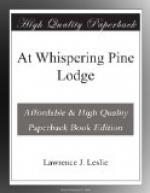The gale still held on, however, and we saw no signs of its abating. The rigging was found to be ill-fitted, and greatly strained; and on the third day of the blow, about five in the afternoon, our mizzen-mast, in a heavy lurch to windward, went by the board. For an hour or more, we tried in vain to get rid of it, on account of the prodigious rolling of the ship, and, before we had succeeded, the carpenter came aft and announced four feet water in the hold. To add to our dilemma, we found the pumps choked and nearly useless.
All was now confusion and despair—but an effort was made to lighten the ship by throwing overboard as much of her cargo as could be reached, and by cutting away the two masts that remained. This we at last accomplished—but we were still unable to do anything at the pumps; and, in the meantime, the leak gained on us very fast.
At sundown, the gale had sensibly diminished, in and, as the sea went down with it, we still entertained faint hopes of saving ourselves in the boats. At eight P.M. the clouds broke away to windward, and we had the advantage of a full moon—a piece of good fortune which served wonderfully to cheer our drooping spirits.
After incredible labor we succeeded, at length, in getting the long-boat over the side without material accident, and into this we crowded the whole of the crew and most of the passengers. This party made off immediately, and, after undergoing much suffering, finally arrived, in safety, at Ocracoke Inlet, on the third day after the wreck.
Fourteen passengers, with the Captain, remained on board, resolving to trust their fortunes to the jolly-boat at the stern. “We lowered it without difficulty, although it was only by a miracle that we prevented it from swamping as it touched the water. It contained, when afloat, the captain and his wife, Mr. Wyatt and party, a Mexican officer, wife, four children, and myself, with a negro valet.”
We had no room, of course, for anything except a few positively necessary instruments, some provision, and the clothes upon our backs. No one had thought of even attempting to save anything more. What must have been the astonishment of all then, when, having proceeded a few fathoms from the ship, Mr. Wyatt stood up in the stern-sheets, and coolly demanded of Captain Hardy that the boat should be put back for the purpose of taking in his oblong box!
“Sit down, Mr. Wyatt,” replied the Captain, somewhat sternly, “you will capsize us if you do not sit quite still. Our gunwale is almost in the water now.”
“The box!” vociferated Mr. Wyatt, still standing—“the box, I say! Captain Hardy, you cannot, you will not refuse me. Its weight will be but a trifle—it is nothing—mere nothing. By the mother who bore you—for the love of Heaven—by your hope of salvation, I implore you to put back for the box!”
The Captain, for a moment, seemed touched by the earnest appeal of the artist, but he regained his stern composure, and merely said:




